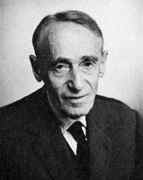Person: Pollaczek, Leo Félix

Leo Félix Pollaczek was an Austrian-French engineer and mathematician who worked in number theory, mathematical analysis, mathematical physics and probability theory.
Mathematical Profile (Excerpt):
- Félix attended the Akademie Gymnasium, the Latin High School, in Vienna.
- Erwin Schrödinger graduated from the school four years before Pollaczek who graduated at the age of seventeen in 1910.
- Pollaczek served in the Austrian army during World War I.
- Pollaczek's thesis advisor was Issai Schur and he undertook research on number theory, working in an area close to the work he had undertaken on Fermat's Last Theorem during the war.
- Pollaczek began publishing papers on mathematical physics, particularly on electrical engineering, the first two being Das Einschaltproblem für das homogene Kabel bei beliebiger Einschaltung Ⓣ(The potential problem for homogeneous cable at any power) (1924) and Theorie der Einschaltvorgänge des vielgliedrigen künstlichen Kabels Ⓣ(Theory of potential of well-balanced artificial cable) (1925).
- It is one of these papers Über eine Aufgabe der Wahrscheinlichkeitstheorie Ⓣ(On a problem in probability theory) published in Mathematische Zeitschrift which contains the result for which he is best known today, the Pollaczek-Khinchin formula.
- Pollaczek was dismissed from his position in the German Postal, Telephone and Telegraph Services as a consequence of these laws.
- Pollaczek's last paper written in German appeared in 1934.
- He was able to obtain a position for Pollaczek as a consultant for the Société d'Études pour Liasons Téléphoniques et Télégraphiques.
- As tensions rose between the countries of Europe, Pollaczek's position in France became more difficult and by 1936 he could not get his visa renewed to continue to work there.
- Aleksandr Yakovlevich Khinchin, who was working on the theory of stationary random processes, had interests similar to those of Pollaczek and had found the same Pollaczek-Khinchin formula a couple of years after Pollaczek.
- Khinchin invited Pollaczek to the Soviet Union.
- Pollaczek spent three months in the Soviet Union in 1937, visiting Khinchin and making trips to a number of universities.
- Even more worrying for Pollaczek was Hitler's announcement in May that he would destroy Czechoslovakia.
- Pollaczek was one of 12,000 Jews in Brno who heard of the increasing anti-Semitic acts throughout Germany with Jewish businesses smashed in November.
- Let us note here that the Pollaczeks did well in leaving Brno for less that 1,000 of the 12,000 Jews there survived the war.
- During this time Pollaczek continued to work in Paris.
- Pollaczek and his wife, as Jews, were again in great danger and there was no way he could continue working for the Centre National de la Recherche Scientifique.
- The Pollaczeks spent the war years avoiding persecution by the Nazis.
- In August 1944 Paris was liberated and Pollaczek was able to begin working again for the Centre National de la Recherche Scientifique.
- During the ten years from 1945 on, Félix Pollaczek worked on yet another mathematical topic, this time mathematical analysis.
- In this area his main interests were in orthogonal polynomials and as well as working on Legendre polynomials, Hermite polynomials and Laguerre polynomials, he introduced polynomials named by Arthur Erdélyi as the 'Pollaczek polynomials'.
- In 1957 Pollaczek published the monograph Problèmes stochastiques posés par le phénomène de formation d'une queue d'attente à un guichet et par des phénomènes apparentés Ⓣ(Stochastic Problems in the phenomenon of the formation of a waiting queue at a counter and related phenomena).
- Pollaczek also published the book Théorie analytique des problèmes stochastiques relatifs à un groupe de lignes téléphoniques avec dispositif d'attente Ⓣ(Analytic theory of stochastic problems with a group of telephone lines waiting for device) (1961).
- Pollaczek received a major award in 1977 from the Operations Research Society of America and The Institute of Management Sciences.
- Pollaczek felt very honoured by this award from the American Operations Research community.
Born 1 December 1892, Vienna, Austria. Died 29 April 1981, Boulogne-Billancourt, near Paris, France.
View full biography at MacTutor
Tags relevant for this person:
Origin Austria
Thank you to the contributors under CC BY-SA 4.0! 

- Github:
-

- non-Github:
- @J-J-O'Connor
- @E-F-Robertson
References
Adapted from other CC BY-SA 4.0 Sources:
- O’Connor, John J; Robertson, Edmund F: MacTutor History of Mathematics Archive
